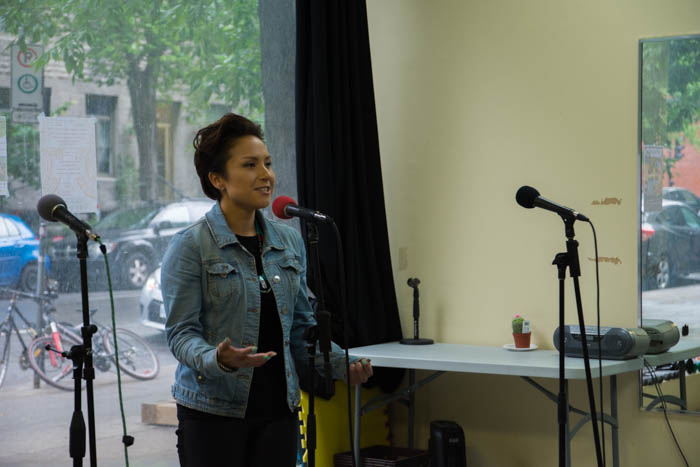In solidarity with Karhiwanoron Immersion Elementary School, the Anti-Canada Picnic brought members of the McGill community together to acknowledge 150 years of what organizers called the “Canadian settler state.” On June 29, Midnight Kitchen (MK), Quebec Public Interest Research Group of McGill (QPIRG McGill) and CKUT-FM 90.3 hosted the fundraiser to collect over $900 for Karhiwanoron. The picnic hosted guest speakers Wentahawi Elijah, a stay-at-home mother and occasional teacher at the Kariwanoron school, and Stephen Puskas, co-producer of Nipivut Montreal, to discuss the school’s financial difficulty, racism, and colonization in Quebec.
The immersion elementary school is located in Kahnawake Mohawk Territory, south of the island of Montreal. It was founded in 1988 by local mothers who made it their mission to teach children in Kanien’keha, the Mohawk language, which has been endangered since its suppression in the residential school system. For these mothers, the preservation of Kanien’keha is essential to the protection of their heritage.
“Karhiwanoron started when a couple of parents came together to discuss their fear of where they stood and the threat of losing our endangered language and culture,” Elijah said during her talk at the picnic. “I was one of the very few fortunate people who was raised speaking Kanien’keha, surrounded by our culture and history.”
Kariwanoron’s curriculum does not conform to the province of Quebec’s education program. Lessons at Kariwanoron tend to be hands-on and sometimes take place outdoors. They emphasize the traditional Mohawk way of life, focusing on nature, medicine, and ceremony.
“The students learn about medicines and their time to be picked; also about planting, when to plant and what words to use in the [harvest] ceremony,” Elijah said. “This comes from giving respect and thanks to what we have.”
The mothers have designed an immersive learning environment for the Mohawk children, in which students learn while participating in the daily customs of Mohawk culture. Classes are kept to about 12 students, and always have two instructors.
“The reason for [the small proportion of students to teachers] is the ideal of being in a home with two parents,” Elijah said. “Not so much [of the curriculum is] focused on reading and writing, which does come into play, but our number one goal is naturally teach the language in a natural environment.”
The school’s model is based on the principle that a people’s culture is predominantly supported by their language. Therefore, at Karihwanoron, teaching Kanien’keha is essential for the protection of Mohawk identity.
“Our language is very descriptive and alive, with a lot of meaning and feeling in it,” Elijah said. “We teach our children at Karhiwanonron the importance of being connected to life, what’s real, what’s a part of us—the earth the water, medicines. We try to […] bring back everything that has become lost in our way of being, what helps us, and who we are.”
Elijah’s message about the Kanien’keha language resonated with attendees from various backgrounds, including Melissa Freed, U2 Arts. For her, Yiddish is equally important to preserving her Jewish heritage, as it does not only provide the people with a means of passing on traditions and customs, but also reflects the tone of their experience.
“The whole feeling of a culture comes with the connotations of language,” Freed said.
“With Yiddish, for example, so many of the words sound funny, and the way you’re supposed to say them makes them sound more funny. It comes from a culture of getting through dark times through joking.”
The picnic hosted attendees from dozens of cultures represented in Montreal, and helped raise awareness of the ongoing struggles of Canada’s indigenous people. Organizers planned that it would take place alongside celebrations of the 150th anniversary of Canadian confederation.
“Lots of people will be having Canada Day barbecues this weekend without thinking critically about what they are celebrating,” MK staff member Wade Walker said. “We saw [the Anti-Canada Picnic] as a chance for popular education on why everyone is not celebrating Canada's 150th, as well as on ongoing indigenous struggles.”
On the picnic’s event page, the organizers brought attention to the fact that picnic would take place on unceded Mohawk territory, Tio’tia:ke.
“Acknowledging that the land we are on is stolen is a small way to honour the Kanien'keha:ka [Mohawk people] and emphasize that this is rightfully their land,” Walker said.
The picnic maintained a kid-friendly environment while addressing the serious issues faced by Canada’s indigenous peoples. While most attendees addressed the threats facing indigenous peoples and their cultures, Kariwanoron students passed the time with the arts-and-crafts provided by the picnic organizers. The picnic concluded with a performance by Odaya, a musical group of indigenous women based in Montreal.









What a great event, beautiful to see cultures and peoples living on despite residential schools and the Canadian government’s best efforts to destroy Canada’s indigenous peoples.